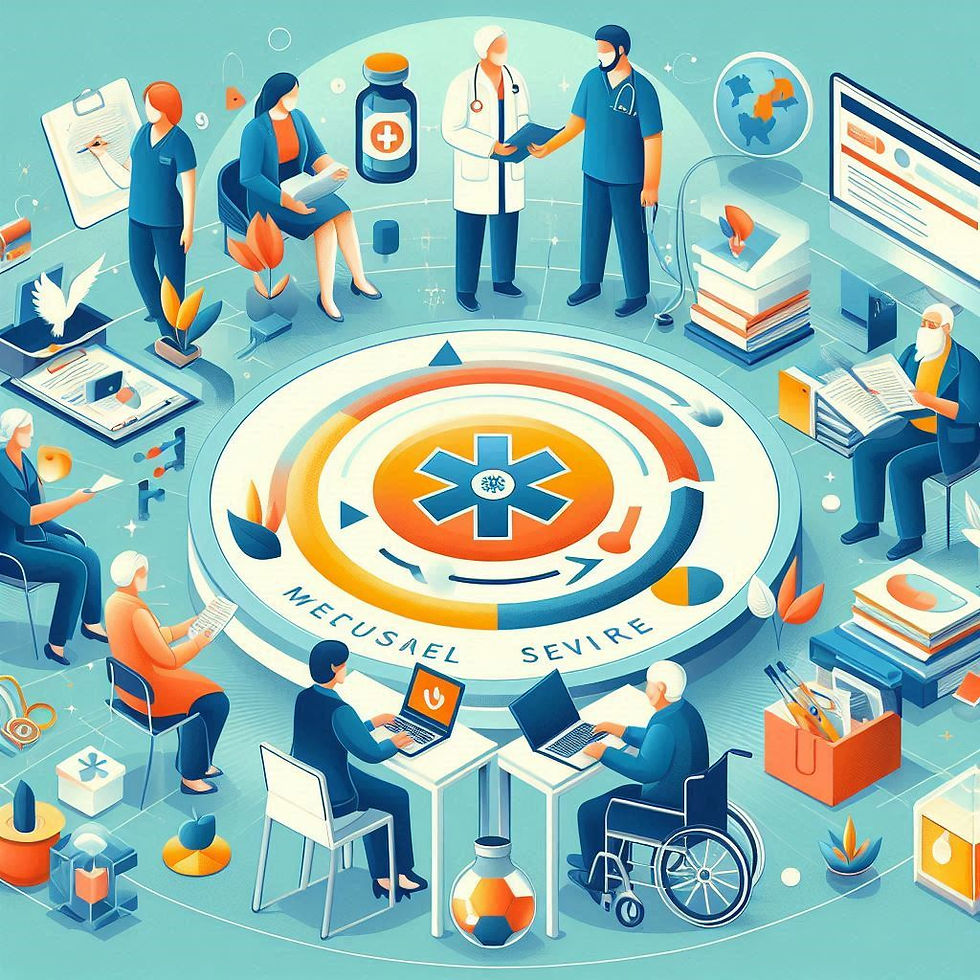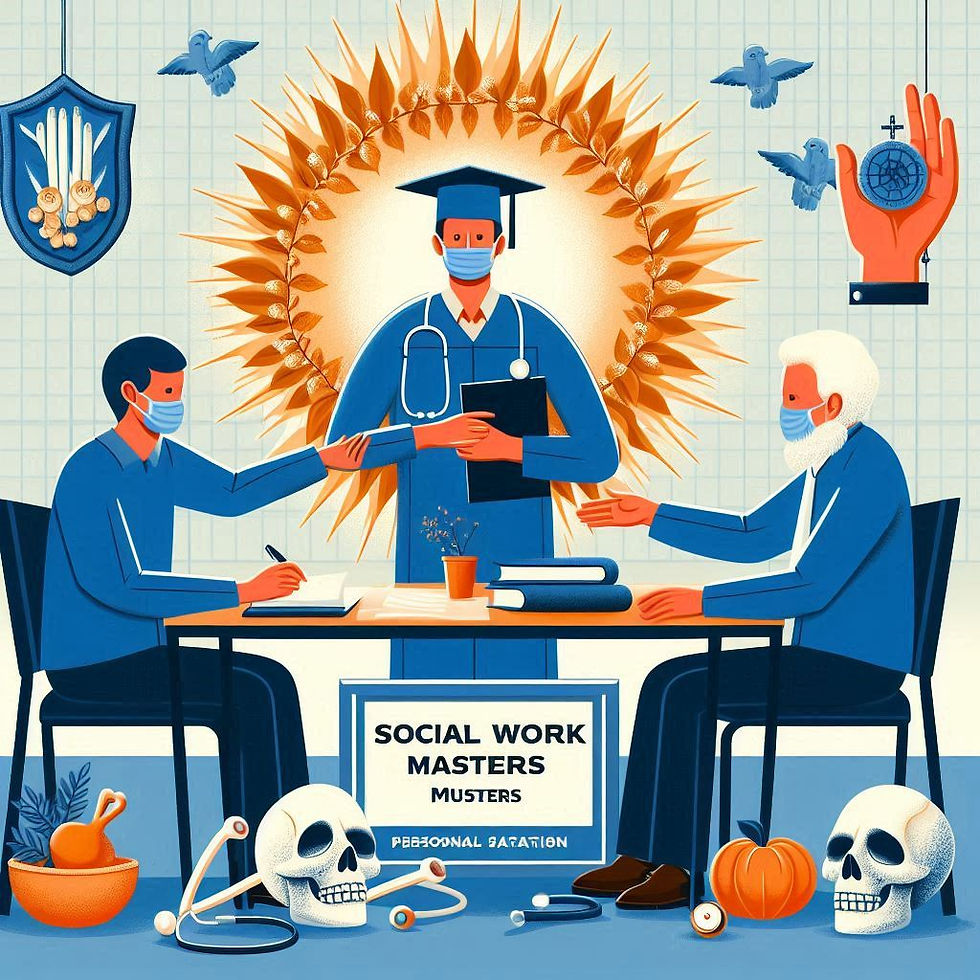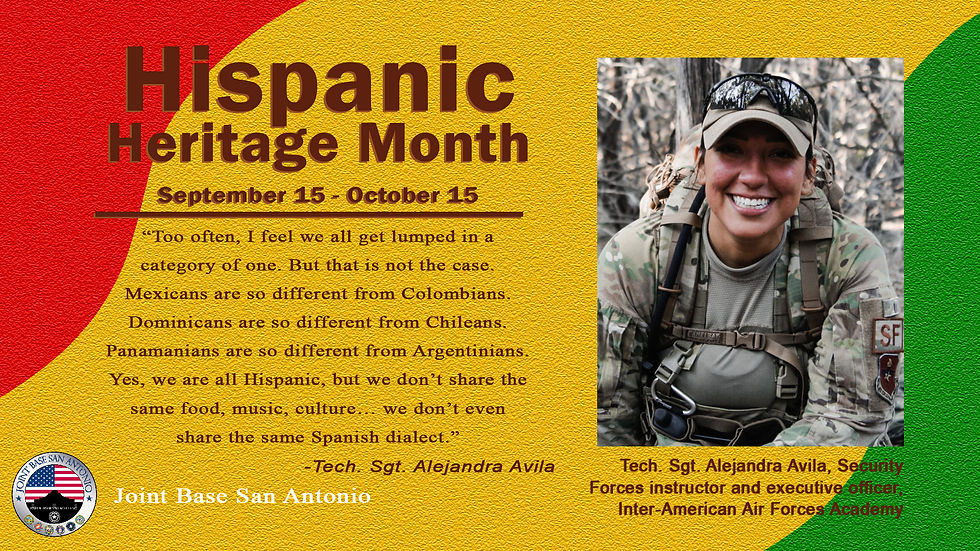MSW Social Work Masters Personal Statement Editor Hospice
- Dec 24, 2023
- 5 min read
Updated: Jun 13, 2024
I very much appreciate the comprehensive character of being a social worker, especially being an advocate for the client and helping them to navigate their way successfully through the system, making the most of those resources that are available for support. I also appreciate how social workers are a part of professional teams of healthcare professionals, providing all manner of treatment regimens, from one-on-one care to family and group counseling. I love how the work is extremely varied, ranging from healthcare advocacy and referrals to client education}

As with any work that involves working with the public, the social worker must be highly culturally competent, being able to reach out to and communicate effectively with people of varying backgrounds, cultures, and creeds. Cultural competency needs to be heartfelt, though, as much a part of the social worker as compassion, something that cannot be taught in the lecture hall. Moreover, at-risk populations encompass people of all socioeconomic statuses as well as cultural differences, thus, the social worker must be in tune with the unique needs of the poor, the sick and the needy, coupled with a desire to help all, and at all costs.
For the future, I anticipate inspiring others to become more engaged in their lives, motivate them, and teach them that even though life’s path is inherently riddled with pitfalls, there is always the ability to begin anew. More specifically, post-graduation, I envision working within Hospice, and upon building my exposure, serving as a lead caregiver, and hosting grief support groups. Moreover, I am aiming to use my work experience as a foundation from which to assist in gerontology research.

Having spent close to three years as a home health aide, I was fortunate to have had contact with patients of all ages, but primarily the elderly. The diversity of clientele has helped build my own cultural competency, as my patients represented many ethnicities, levels of society and socioeconomic status. Furthermore, I helped patients with all manner of conditions and ailments, cancer, AIDS, Alzheimer’s, and Parkinson’s to name but a few. I took from this time in my professional career a sense of deep and profound privilege to be with a patient in their most vulnerable stages of life.
I will never forget one of my patients, a 60-year-old man, dying of brain cancer, a man and family I served for but eight short hours. Upon arriving at the gentleman’s home, I found him, and his wife, but their three sons were all living out of state. In minutes, I assessed that the man had less than 24 hours to live. Taking the man’s wife to one side, I explained that she needed to inform her sons right away, and events unfolded around me: the sons booking their flights while the woman shared beautiful memories of her time with her husband. As time went on, she became more frantic, asking, “What should I do?” Having worked alongside hospice nurses, I knew this moment would come, the most painful of questions we ever face. I explained that while her husband was in a transitional period, he could still hear her, that he needed to hear that she and the boys would be fine, that they were on their way, and that they all loved him very much. Knowing that people sometimes hang onto life out of worry, I explained that her assurances would let her husband pass in peace. Her relief was apparent, and her involvement in the process was, she felt, the least she could do. That brief amount of time has stayed with me ever since, marking the most gratifying experience of my life. I had empowered someone to assist in their loved one’s last moments. What greater display of our humanity could I offer for her or for any person I help through my future work?
While home healthcare work became too physically taxing for me, I never lost my desire to help others and their families in their times of need. Indeed, while my time as a home healthcare worker “ended”, I have continued working for various behavioral health agencies as an administrative assistant. To my mind, though, my work to date has not been as personally or professionally satisfying as it could, going only slightly beyond a means to an end. While I have steadily progressed into more senior positions, increasing my responsibilities and the numbers of people I supervise, I know I can contribute so much more to society, and I will be able to do that with an MSW. In preparation and anticipation of my MSW program, I have taken part in seminars and in-services normally reserved for social workers, even though I earn no continuing education units through these efforts.

My introduction to social work was one of a deeply personal nature. When my first long-term relationship ended in suicide, I received counseling from a social worker. It was not this trial that I fully appreciated how much I longed to work in a capacity where I touched people’s lives, making a positive, sustainable impact. Now I have the chance to turn my negative experiences into positive energy, as a force for growth in the community, bringing hope to those going through similar challenges, never allowing my nightmare to have been in vain.
My social worker offered me great insights into what I was going through, carefully examining the steps, the stresses, both inside my mind and heart, and those in my life. I was impressed with many things about my social worker, how the conversation was not just about my mind or my family, but how things were going to be financially, how I would feel when I returned home, and how I would handle my future. After my ordeal, I heard a quotation by Deepak Chopra that succinctly describes the compassion I was shown: “In the giving of oneself there is a direct experience of pain, yet in the giving there is love. Thus, compassion has the power to dissolve pain by not avoiding it.”
Having been there before, and equipping myself with an MSW, I would be the ideal sounding board, a soft place to fall, for the people I counsel. When I see a client in a hole they cannot get out of, I will get in the hole with them. I will be able to tell them not to worry, I have been here before, and I know the way out. More specifically, I have taken from my own experiences and self-guided further education the stages of grief, the need to impress upon the survivors that the situation is not their fault, and to not “catastrophize”. Indeed, seeking out further guidance, I learned to cope with my feelings and apply what I had learned to other relationships in my life, but more importantly, learned living skills to take care of myself.
As a professional social worker, I need to learn to share only what is necessary to help others, to develop different approaches to therapy and how to balance listening, guidance, disclosure. While I am a truly empathetic individual, I need to train myself to release my clients’ problems when I complete my daily work routine, to not “bring their problems home with me”.
My talents are still raw, and I need training to make the most of my ardent desire to equip people with basic coping skills and increase self-efficacy and esteem, natural ability is not enough. Knowing that people need to understand that blame and guilt are useless self-destructive cycles, how to impress upon them self-acceptance and respect of their limitations is only half the battle; fostering a sense of inner peace is key. Through XXU’s graduate Social Work program, my sole choice for academic development, I am confident that I can develop my own set of clinical skills, and acumen.
Thank you for your time and consideration.
MSW Social Work Masters Personal Statement Editor Hospice






Your statement reads as a deeply human, emotionally intelligent, and purpose‑driven narrative that captures the essence of why people enter the field of social work. What stands out most is the sincerity running through every section—this isn’t a generic expression of interest but a lived, felt, and hard‑earned understanding of what it means to serve others at their most vulnerable.
The way you articulate the “comprehensive character” of social work shows a mature grasp of the profession’s complexity. You don’t romanticize the field; instead, you highlight the advocacy, the navigation of systems, the interdisciplinary collaboration, and the constant balancing act between emotional presence and professional boundaries. That grounding gives your motivations credibility.
Your emphasis on cultural competency is especially compelling.…